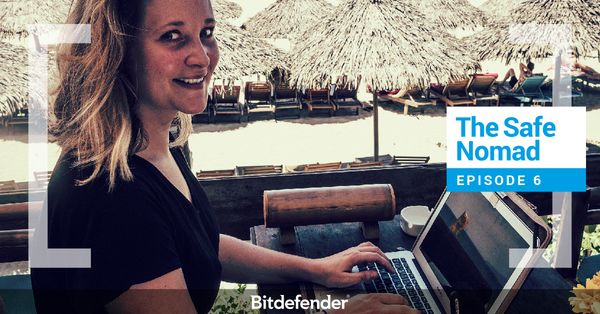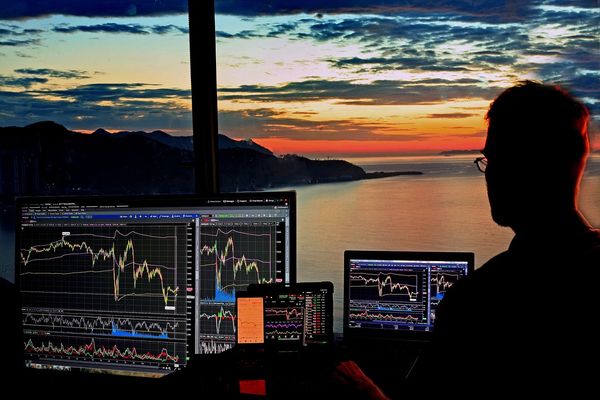The Safe Nomad (6). Caroline Van Keeken, The Netherlands: "I am a happy slave to my work"; a writer"s definition of freedom

In our culture, when we say “writer” we see an aged man, brow furrowed, punching out word after word from his battered typewriter. A lonely cup of coffee by his side. Trail of smoke rising from the embers of his 40th cigarette. His nights drowned in aged scotch, slouched beside the fireplace brooding for inspiration.
Caroline Van Keeken challenges this archetype and then some.
At the age of only 29, this beautiful woman is already an acclaimed journalist and author back in her native country Holland. She wakes up every morning at 5.30, does yoga until 7, then hides in a quiet spot and works until sunset. This quiet spot can be anywhere: Holland, England, Southern France, Hungary or, this time, in Hoi An, Central Vietnam.
I was shocked when she suggested that we have our conversation right after her yoga class. “It”s cooler in the early morning, she said. Then it gets too hot.”
I, as an old-school cliché-type of writer, don”t do mornings. At 10 o”clock we took a short walk down the picturesque An Bang beach to the cozy “Soul Kitchen” cafe; the sand was already so hot that it burnt my feet through the soles of my flip-flops. (I still feel the burns.) I should have listened to my younger counterpart”s suggestion. Or maybe I should have worn shoes.
We sat, ordered coffee and passion fruit smoothies, and I switched on my voice recorder. During the next hour, Caroline used the words “work” and “think” about 50 times each. That”s quite a tell-tail for what she”s up for in her life.
“I write so I can write more.”
Right after high school, Caroline moved to England for a couple of years: she took singing classes, worked as a singer in a bar, as a make-up artist, as a hostess in a club, and as a clerk for a warehouse. She liked to explore and observe.
Then she came back to Amsterdam and studied European Science and Journalism, with a focus on Eastern Europe and, more specifically, on Russian affairs. She went to Moscow to do research for her Master”s degree at the Moscow Times and, ever since, she spends at least one month per year in the Russian capital, covering interesting social subjects for the Dutch media.
“I”ve always been a freelancer and I”m able to manage my own time efficiently. I could write articles for newspapers and commercial clients in Holland. The money I earned, gave me time to travel for a while and work on my next book. It”s hard for a journalist to have a big project such as a book because it demands that you sit still for long periods of time and commit to it fully.”
Simply put, Caroline writes articles so that she can write books. She works so that she can work more. This arrangement allows her to pursue the childhood dream of being a novelist.
A child”s dream comes true
“I was always making up stories. I was a very unsociable kid and spent my whole time just reading, writing and observing people without actually socializing. I was very curious about everything around me, and I needed a lot of time for myself, to think and to write.”
Her dream of becoming a true writer came to fruition in 2016, when Dutch TV network, NPO, held a national short stories contest. She won first prize and was awarded a master class with the famous writer, Thomas Verbogt. They got along brilliantly and decided to meet once a month, drink wine and check Caroline”s progress.
In March 2017, she launched “Zo Worden Wij Niet” (“We Won”t Become That Way”) a collection of short stories which was instantly acclaimed by media and readers alike. What”s the book about? Bottom-line, it”s about freedom.
“All the stories in this book talk about what happens in the minds of people when they feel stuck. I”m fascinated by people who do exactly what they”re expected to do and who seem to like this conformity. I”m intrigued by boringly happy fathers. By husbands who think that there”s nothing else in life other than being a husband. By neighbors for which being a good neighbor is all there is.
We can easily get stuck in the networks we create, be it family, friends or workmates. We start doing what everyone around expects us to do and we forget to think by ourselves, and about ourselves.
But there comes a point when we feel so stuck and miserable. We try to think of a way out. Some take drugs and escape into a world of chemically-induced fantasy. Others prefer the option of quitting their jobs and running away forever. It”s that moment that my book explores; yes, bottom-line it”s a book about freedom.”
She adds: “Freedom is the ability to not overly care about other people”s expectations. A free person is one who has found the proper balance between not giving a damn and being overly responsible.”
We got you, Caroline!
“Traveling opens my brain“, Caroline admits. “I become very creative while moving. Traveling helps you focus better because you don”t get sucked up in the mundane details of your daily life at home; such as finding a parking spot, calling the plumber to fix your kitchen sink, or paying your electricity bill.”
As a matter of fact, it”s traveling that put her in the right mood to start working on her next book. She took a month off and came to Hoi An just to relax. But while taking a walk down the beach, she got struck by inspiration. All the subjects she had in mind suddenly connected and she knew what the next novel would be about.
She Skyped Amsterdam and told her editor “Hey, I have this idea for my new book.” “Go ahead“, the editor replied, so she settled in Hoi An to work. Luckily, she had the perfect place to start writing; the Hub Hoi An co-working space had just opened a few months earlier. She purchased a membership, took a seat under the shadow of the banana trees, opened her laptop – wrapped in a cover that makes it look like an old book – and started typing.
“I don”t think my working day ever really ends. I think I am my work. It”s in my head all the time; and I take work very personally. I take full responsibility for what I do and create, that”s why I need to feel good and proud of whatever I write, be it books, newspaper articles, or commercial copy. I hardly ever feel that I am seriously working because I love what I do. I enjoy my work so much that I sometimes think there will come a day when they will find out, take me from my working desk, put me in some office and say: We got you, Caroline. You thought you could have this forever? Not possible, young lady!”
I asked her how she overcomes procrastination, a phenomenon so frequent among writers in particular and creative people in general. Her answer was surprising and soothing.
“Sometimes it works to just give in to it. If you feel like you”ve been on Facebook for an hour and not done anything useful, get up and go to the market. Or re-arrange all your books in alphabetical order. Do something opposite from your work. Break the circle; otherwise you”ll be caught on Facebook or whatnot for 5 more hours.”
About technology
“I feel at home when I open my laptop. Everything I need is inside there or safely backed-up in my email account. It”s because of technology that I am able to live and work as I do. Otherwise I would have to send packages to my publishers with the Vietnamese post every Sunday (Brad”s note: like Oliver used to do in the “90s). I use technology – specifically the Internet – to do a lot of research for my books. I research my character”s jobs, mental conditions, and reality check to see if they would act and behave the way I imagined.
I use my phone mostly for navigation. I get lost so easily, even in Amsterdam. It helps me find my way and thus it gives me a sense of security and freedom, I use Spotify to listen to music while I write and Skype with my publisher, clients, and friends”
Achieving a sense of security. Doing your thing, and feeling protected.
“It gives me a sense of security to know that, wherever I am, I can work. I can work behind the bar here if needed to. Also, I feel secure that I know a few people here. Living alone on a deserted island is not my kind of ideal, I like having people around me.”
“I feel happy. I just feel very happy at this point in my life because I am doing exactly what I want to do. I am a slave to my work, but not in a prison-like sense. I am a happy slave.”
tags
Author
From his base in Thailand Brad journeys around the world – from Papua to the Carribean – seeking for deep, meaningful stories about humanity, nature and life.
View all postsRight now Top posts
Start Cyber Resilience and Don’t Be an April Fool This Spring and Beyond
April 01, 2024
Spam trends of the week: Cybercrooks phish for QuickBooks, American Express and banking accounts
November 28, 2023
3 in 5 travel-themed spam emails are scams, Bitdefender Antispam Lab warns
August 10, 2023
FOLLOW US ON SOCIAL MEDIA
You might also like
Bookmarks

















